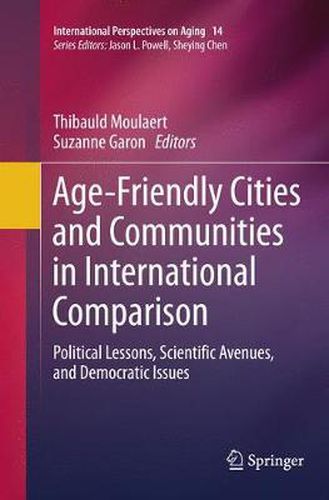Readings Newsletter
Become a Readings Member to make your shopping experience even easier.
Sign in or sign up for free!
You’re not far away from qualifying for FREE standard shipping within Australia
You’ve qualified for FREE standard shipping within Australia
The cart is loading…






This title is printed to order. This book may have been self-published. If so, we cannot guarantee the quality of the content. In the main most books will have gone through the editing process however some may not. We therefore suggest that you be aware of this before ordering this book. If in doubt check either the author or publisher’s details as we are unable to accept any returns unless they are faulty. Please contact us if you have any questions.
The supportive role of urban spaces in active aging is explored on a world scale in this unique resource, using the WHO’s Age-Friendly Cities and Community model. Case studies from the U.S., Canada, Australia, Hong Kong, and elsewhere demonstrate how the model translates to fit diverse social, political, and economic realities across cultures and continents, ways age-friendly programs promote senior empowerment, and how their value can be effectively assessed. Age-friendly criteria for communities are defined and critiqued while extensive empirical data describe challenges as they affect elders globally and how environmental support can help meet them. These chapters offer age-friendly cities as a corrective to the overemphasis on the medical aspects of elders’ lives, and should inspire new research, practice, and public policy.
Included in the coverage:
A critical review of
the WHO Age-Friendly Cities Methodology and its implementation. Seniors’ perspectives on age-friendly
communities. The implementation of
age-friendly cities in three districts of Argentina. Age-friendly New York City: a case study. Toward an age-friendly European Union. Age-friendliness, childhood, and dementia:
toward generationally intelligent environments.
With its balance of attention to universal and culture-specific concerns, Age-Friendly Cities and Communities in International Comparison will be of particular interest to sociologists, gerontologists, and policymakers.
Given the rapid adoption of the age-friendly perspective, following its development by the World Health Organization, the critical assessment offered in this volume is especially welcome .
Professor Chris Phillipson, University of Manchester
$9.00 standard shipping within Australia
FREE standard shipping within Australia for orders over $100.00
Express & International shipping calculated at checkout
This title is printed to order. This book may have been self-published. If so, we cannot guarantee the quality of the content. In the main most books will have gone through the editing process however some may not. We therefore suggest that you be aware of this before ordering this book. If in doubt check either the author or publisher’s details as we are unable to accept any returns unless they are faulty. Please contact us if you have any questions.
The supportive role of urban spaces in active aging is explored on a world scale in this unique resource, using the WHO’s Age-Friendly Cities and Community model. Case studies from the U.S., Canada, Australia, Hong Kong, and elsewhere demonstrate how the model translates to fit diverse social, political, and economic realities across cultures and continents, ways age-friendly programs promote senior empowerment, and how their value can be effectively assessed. Age-friendly criteria for communities are defined and critiqued while extensive empirical data describe challenges as they affect elders globally and how environmental support can help meet them. These chapters offer age-friendly cities as a corrective to the overemphasis on the medical aspects of elders’ lives, and should inspire new research, practice, and public policy.
Included in the coverage:
A critical review of
the WHO Age-Friendly Cities Methodology and its implementation. Seniors’ perspectives on age-friendly
communities. The implementation of
age-friendly cities in three districts of Argentina. Age-friendly New York City: a case study. Toward an age-friendly European Union. Age-friendliness, childhood, and dementia:
toward generationally intelligent environments.
With its balance of attention to universal and culture-specific concerns, Age-Friendly Cities and Communities in International Comparison will be of particular interest to sociologists, gerontologists, and policymakers.
Given the rapid adoption of the age-friendly perspective, following its development by the World Health Organization, the critical assessment offered in this volume is especially welcome .
Professor Chris Phillipson, University of Manchester